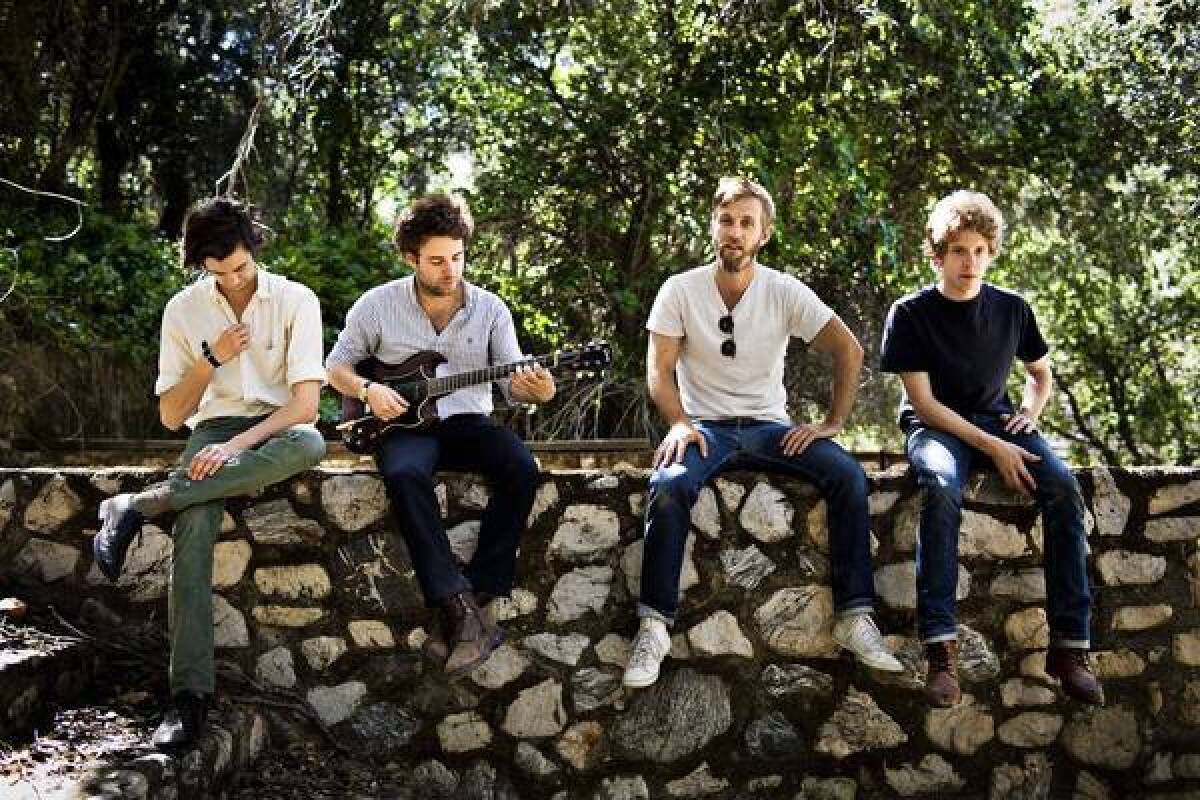Dawes adds fresh sentiments to folk-rock roots

Members of the L.A. quartet Dawes have been performing for paying audiences since they were teenagers, so there was no reason John Fogerty could see to go easy on them.
“Let’s do it one more time,” said the veteran roots rocker, standing onstage in jeans and a plaid shirt at the Moody Theater in Austin, Texas.
Fogerty had recruited Dawes to back him during a concert at the South by Southwest music festival — part of the lead-in to his upcoming album of all-star collaborations — and in an early-afternoon soundcheck the musicians were running through the Creedence Clearwater Revival song “Someday Never Comes.”
It was the fourth time they’d played it, each as crisp as the one before.
“You watch a guy like that work, and it’s like, ‘Wow — that’s what it looks like to have 40 years under your belt,’” said Dawes’ frontman, Taylor Goldsmith, over lunch at a nearby Mexican restaurant after the rehearsal.
He and his bandmates — bassist Wylie Gelber, keyboardist Tay Strathairn and Goldsmith’s younger brother Griffin on drums, ranging in age from mid-20s to early 30s — were enjoying a rare breather at SXSW, where Dawes played 14 gigs over the course of six days. “Being around him is a reminder of what true commitment is.”
Dawes has plenty of other reminders: Beyond Fogerty (with whom the band is to reteam Wednesday for an appearance on “Late Show With David Letterman”), it’s toured and recorded with Jackson Browne, Robbie Robertson and Benmont Tench of Tom Petty’s Heartbreakers. And earlier this month the band finished opening a string of college shows for one of its heroes, Bob Dylan.
Civilians have responded too. Widespread airplay on public-radio stations such as L.A.’s KCSN-FM helped drive the group’s strong new disc, “Stories Don’t End,” to the top five of Billboard’s independent albums chart.
But it’s easy to hear why so many established artists are attracted to Dawes, which grew out of a punkier band called Simon Dawes that Goldsmith and Gelber formed at Malibu High School with Blake Mills, a guitarist who’s since become one of L.A.’s most in-demand session players. On “Stories Don’t End” Dawes strums and shuffles its way though a dozen handcrafted folk-rock tunes that sound as if they were nourished on classics such as Browne’s self-titled debut and the Band’s “Music From Big Pink.”
“You’re rewarded for your attention to these songs, and that’s not really that common today,” said Browne, who toured Spain in 2011 with Dawes behind him. “There’s a quality to contemporary music — it’s a condiment, an accompaniment to whatever else you’re doing. But these guys go back to a time when songs explained their own existence.”
A proudly old-fashioned sensibility permeates the band’s music, which eschews the hard sparkle and the compact economy of modern pop; songs such as “Side Effects” and “Something in Common” take their time getting where they’re going, as Goldsmith savors a lyric or his bandmates offer up a bit of instrumental color. Even the title of “Stories Don’t End,” Dawes’ third full-length album, seems to be aligning the group with some earlier mind-set, a continuum of down-home wisdom.
Yet as a songwriter Goldsmith keeps those stories grounded in the circumstances of his era; he’s not singing about darning socks by candlelight or reanimating the Laurel Canyon pastoralism of his SoCal forebears. “Grab your cigarettes and follow me out of the living room,” he sings in “Someone Will,” “And I’ll get drunk enough to tell you how I feel.” In “From a Window Seat” he’s buckled into his seat on an airplane, looking down at L.A. for inspiration but finding only “buildings and a million swimming pools.”
In Austin those fresh sentiments seemed to connect with the youthful crowd gathered to see Dawes in the parking lot at Waterloo Records, where it had no trouble sharing a bill with the Danish electro-pop act Indians. And it’s that kind of currency that might help the band capitalize on the current folk-rock revival that’s made huge stars of the Lumineers and Mumford & Sons, which last fall picked Dawes to open its two shows at the Hollywood Bowl.
Jacquire King, who produced “Stories Don’t End,” said he expects a breakthrough for Dawes, and he’s in a position to know, having overseen roots-to-riches records by Kings of Leon and the Icelandic outfit Of Monsters and Men. “The doors kind of had to be kicked open a little,” King said, “but I think the time for them is right.”
As the group finished lunch and prepared to head off to yet another engagement at SXSW, Goldsmith insisted he’s less concerned with the size of the band’s shows or the number of records it sells than with the idea that it’s always improving. Like Dylan, Fogerty and any number of guys with 40 years (or more) under their belts, the members of Dawes see themselves in a long game, one in which working a song over and over again doesn’t feel like work at all.
“One thing that allows us to get better,” Goldsmith said, “is a refusal to believe that we’re actually any good.”
More to Read
The biggest entertainment stories
Get our big stories about Hollywood, film, television, music, arts, culture and more right in your inbox as soon as they publish.
You may occasionally receive promotional content from the Los Angeles Times.











